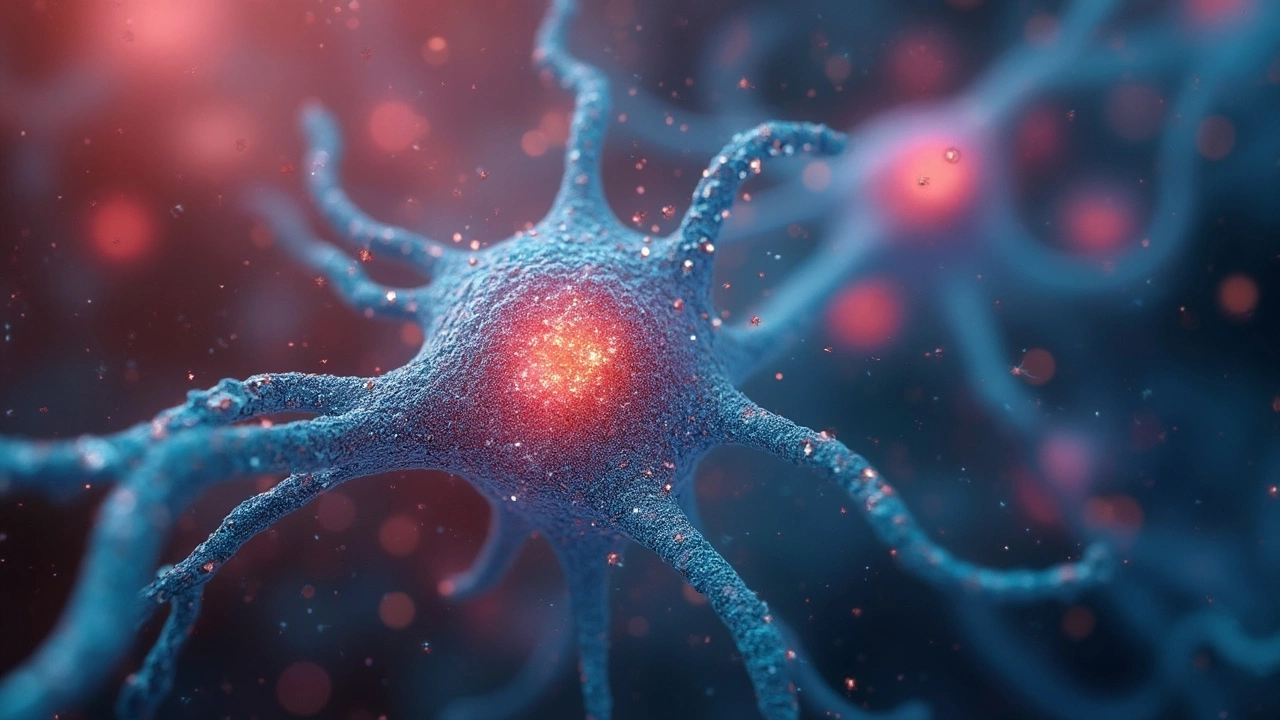Nerve damage can be a real pain, literally. Whether it's from an injury, a medical condition, or just the wear and tear of daily life, our nerves sometimes need a little help. But did you know that vitamins can play a big role in helping them heal?
Vitamin B12 is a superstar when it comes to nerve health. It's like a maintenance crew for your nervous system, helping it function smoothly. Without enough B12, your nerves might not get the repair work they need, leading to things like numbness or muscle weakness.
Most of us get B12 from foods like meat, eggs, and dairy, but if you’re vegan or have absorption issues, you might need a boost. Taking a B12 supplement can be a simple way to make sure your nerves are getting the support they need.
- Understanding Nerve Damage
- The Role of Vitamins
- The Power of Vitamin B12
- Diet and Supplementation Tips
- Seeking Professional Guidance
Understanding Nerve Damage
Our nerves are like the communication lines in our body, sending signals from the brain to every nook and cranny. When these get damaged, it’s like a phone line being cut—messages just don’t get through properly. This nerve damage is technically called neuropathy, and it can mess with how we feel and move.
There are different types of nerve damage, and they show up in various ways. You might feel numbness, experience tingling sensations, or even notice weaker muscles. Causes can range from physical injuries to diseases like diabetes, which is a big-time culprit in nerve problems.
Ever wonder what happens when nerves get hurt? They have varying capacities to heal themselves, depending on the severity and type of damage. Peripheral nerves, those outside the brain and spinal cord, have a better shot at recovery compared to others.
When we're talking about fixing nerve problems, diet plays a huge role. Specific vitamins, especially Vitamin B12, are crucial in helping nerves repair themselves. They can aid in regenerating the protective coatings around nerves, called myelin, and support overall nerve function.
Repairing nerve damage takes time and patience. While vitamins are part of the solution, they are not a miracle cure. It's vital to understand the underlying causes of nerve damage to tackle it properly.
| Common Causes | Possible Symptoms |
|---|---|
| Diabetes | Numbness, pain |
| Injury | Weakness, tingling |
| Infections | Pain, loss of sensation |
The Role of Vitamins
Vitamins are like the unsung heroes when it comes to keeping our bodies running smoothly—especially when we're talking about nerve damage. They work quietly in the background but can make a huge difference in how well our nerves recover and function.
First off, let's talk about why these little nutrients are so important. Vitamins are crucial for cell production and repair, and since nerves are made up of cells, they can seriously help with nerve recovery. And here's the kicker—some vitamins actually help protect nerve cells from further damage and even support the formation of new nerve tissues. This can be crucial if you're trying to bounce back from an injury or a condition that's taken a toll on your nervous system.
But not all vitamins play the same role. For nerve health, the B-vitamins, especially Vitamin B12, stand out. B12 helps in building and maintaining the protective covering around nerves, known as the myelin sheath. Without a healthy myelin sheath, nerve signals can't travel as efficiently, and that's when you start feeling things like tingling or weakness.
Besides B12, Vitamin D and Vitamin E also have roles to play. Vitamin D is known for strengthening bones, but it also supports nerve health by maintaining the myelin sheath. Vitamin E acts as an antioxidant, fighting off free radicals that can cause nerve damage.
- Vitamin B12: It's crucial for repair and protection of nerves. Found mostly in meat and dairy.
- Vitamin D: Helps in maintaining myelin sheath and thus supports nerves. You can get it from sunlight and fortified foods.
- Vitamin E: Acts as an antioxidant. Found in nuts, seeds, and spinach.
Incorporating these vitamins into your diet or via supplements (especially if you're deficient) can provide the nutrients your nerves need to repair and function better over time. It's like giving them the tools to do their job right.

The Power of Vitamin B12
When it comes to fixing up those frazzled nerves, Vitamin B12 really steps up its game. This vitamin isn't just any ordinary vitamin; it plays a crucial role in the formation of myelin, which is that protective sheath around your nerves. Imagine myelin as the plastic coating on wires—keeping everything safe and sound.
Without enough B12, your nerve cells might send mixed signals, or worse, not work as efficiently. This can lead to some annoying symptoms like tingling or numbness. Not fun!
Here’s a cool fact: your body doesn’t produce B12 naturally. That means you’ve got to get it through what you eat. Foods rich in B12 include animal products like meat, fish, eggs, and dairy. Vegans and vegetarians might find themselves running low, which is why B12 supplements can be a good idea.
Looking for numbers? About 20% of people over 60 have low levels of B12, which can sneak up with tiredness or mood changes. Keeping levels in check especially as you age might help your nerve health in the long run.
But don’t worry! Adding a B12 supplement or adjusting your diet is usually all it takes to see an improvement. Always good to have a chat with your healthcare provider before making big changes to your diet, though.
Diet and Supplementation Tips
Boosting your nerve health through diet is not as daunting as it may seem. The trick is knowing what foods pack a punch when it comes to Vitamin B12. For meat-eaters, enjoying beef, chicken, and fish like salmon or tuna can keep your B12 levels in check with just a few servings a week.
Vegans and vegetarians don't need to worry—there are options for you too. Fortified cereals and plant-based milks are great go-tos. And let's not forget nutritional yeast, which is basically a vegan’s best friend for a B12 boost.
Supplements are another route if diet alone isn’t cutting it. Many people opt for B12 pills or chewables, especially if they have absorption issues. There's even a B12 patch for those who prefer a no-fuss approach.
To make sure you're getting the right amount of B12, here’s a quick guideline:
- Adults generally need about 2.4 micrograms per day.
- Pregnant or nursing moms might need a bit more.
It's always a good idea to check in with a healthcare professional before making any big changes, especially if you're thinking of starting a new supplement. They can help make sure you're on the right track and not overdoing it, which can sometimes do more harm than good.

Seeking Professional Guidance
If you're dealing with nerve damage, you're probably wondering when to ask for a pro's help. It's always a good idea to tap into the expertise of an orthopedic specialist or neurologist. These folks know nerves inside and out and can give you a more accurate picture of what's going on.
A specialist might begin with a few basic tests to figure out the extent of the damage. This could include something called a nerve conduction study or an MRI. They might also check your Vitamin B levels, including Vitamin B12, to see if a deficiency is part of the problem.
Once they have the full story, they can offer a plan. Treatment may involve physical therapy, medications, or vitamin supplements. In situations where diet isn't enough to boost your B12 levels, a doctor might suggest B12 injections for a more direct approach.
But it doesn’t stop there. They'll keep tabs on your progress and tweak your treatment plan as needed. Plus, they can give you pointers on pain management and improving your daily life while on the road to recovery.
So don’t hesitate to reach out. Proper professional advice can make a world of difference and help put you on the right track for gaining back your nerve health.
